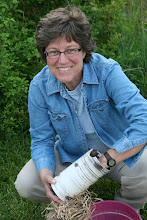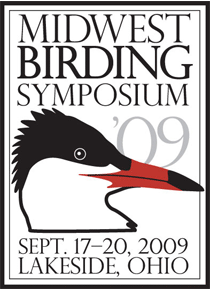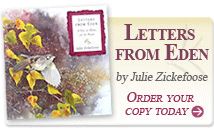Crack is a Better Name for It
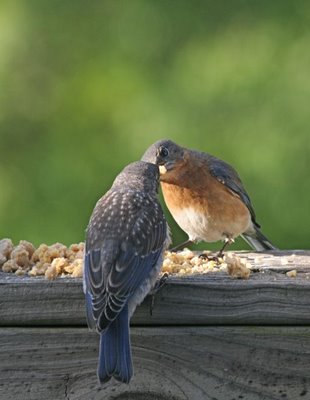
Upon viewing the bluebird foot photos, I put in a call to my favorite avian veterinarian: Robert Giddings, DVM, Diplomate, Association of Avian Veterinarians, of Kensington Bird and Animal Hospital in Kensington, Connecticut. Two decades ago, he was Charlie the macaw's veterinarian, he patched up my busted wild birds in return for help around the office, and I still turn to him with avian health questions.
Zick: "Hi, Bob. Can birds get gout?"
Bob: "Oh, yes. It's pretty common in caged birds. There was a pellet made by Pretty Bird that had too much protein and Vitamin D in it, that caused gout in quite a few cockatiels, but any diet that's too rich can cause it, just as it can in humans."
Zick: AH-HA!!!
I described the bluebird's feet to Bob--red, swollen, inflamed, and obviously causing the bird great pain. He agreed that articular gout was the most likely culprit. It's caused by a diet too high in protein (peanut butter?) and fat (lard-- You think?). Lots of purine in lard, it turns out. Gout is caused by an excess of uric acid in the body, which can be caused by increased intake of foods containing purines, which are metabolized to uric acid in the body. Over time, elevated levels of uric acid will lead to deposits of it in connective tissue around joints. Eventually, the uric acid may form crystals in the joints, leading to acute pain and inflammation.
In pet birds, gout is treated with alepurinol and colchicine, both antipurine medications, as well as pain medications. In wild birds, the only possible course would be to remove the offending food. I had already done that; had been cutting slowly back over the last three weeks. Now, I was putting out just enough "Zick dough" on occasional mornings to bring the birds in for a few minutes so I could photograph their poor little feet.
Bob: "Surely, these bluebirds are eating other things than this suet dough, right? A wild bird shouldn't overeat any one item when there are all kinds of natural foods out there."
Zick: "You'd have to know bluebirds. They are the ultimate addictive personalities. Offer them mealworms or suet dough, and they'll take the easy out every time, gorging on it to the exclusion of anything else."
Bob said that I should see a clearing of symptoms as time passed and the bluebirds resumed taking a natural diet. So for the past three weeks I have been photographing bluebird feet at every opportunity. It's become a little hobby. And I am delighted to say that the front yard male is standing strongly on both feet, showing just a little residual swelling in what we'd call his right "ankle"--the junction of his toes. And the backyard female now stands up tall on both feet, and the redness is gone, along with the worst of the swelling. She's not puffed up any more, and she's building a nest for her second clutch of eggs.
WHEWWW. I am so sorry, bluebirds. You deserve much better than to be fed mass quantities of a food that's flat-out bad for you. News flash: Mass quantities of mealworms are JUST AS BAD for bluebirds as is Zick dough. They're deficient in phosphorus, too high in protein and fat, and they mess the birds up. Don't feed mealworms in summer. Just stop it. They do not need your subsidy. I know, they'll tell you they're starving without you. Don't believe it.
I know there are many of you out there having tons o' fun feeding suet dough to birds this summer, watching them feed it to their babies. I've been doing that for years. I field calls all the time from people who have their birds addicted to mealworms, who suddenly panic when they go on summer vacation, and call me to ask what they should do about their bluebirds. Surely they'll starve without me!
What's wrong with this picture? It's the conceit that we are indispensible to wild birds; that our artificial foods (and yes, mealworms, fed to the exclusion of anything else, are an artificial food) are keeping them alive.
I have one plea. Stop NOW. Feed them in ice storms; when snow covers the ground; when they truly are having trouble finding food. Give it to them when it rains for a week in June and goes down to the 40's at night. But don't give it to them in the warmth of spring and summer when natural food is abundant, when the grasshoppers, crickets, spiders and caterpillars, bursting with nutrients and live enzymes and amino acids, are everywhere to be found. You wouldn't feed your kids candy for breakfast, lunch and dinner and expect them to thrive. Make no mistake: they'd be happy to have it, and they'd gobble it down and beg for more, but kids don't know what's bad for them. Neither, apparently, do wild birds. It's up to us to have the good judgement to do what's best for them.
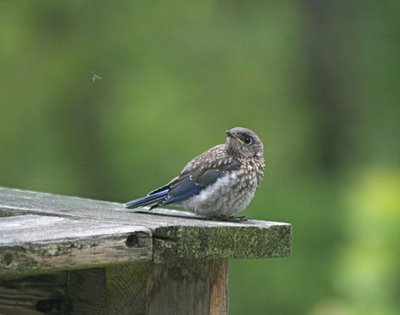 Bluebird fledgling, staring at a natural food item
Bluebird fledgling, staring at a natural food itemNever forget that we feed birds for our own pleasure and enjoyment, not because it's good for them. Feeding birds is a human conceit, and coming to the conclusion that they depend on us for their very survival is a scam that they encourage us to believe. Don't buy it. They're much, much better off without our food stamps. Mealworms or suet dough: if you're feeding your bluebirds every day, you're doing them no favors. You're compromising their health.
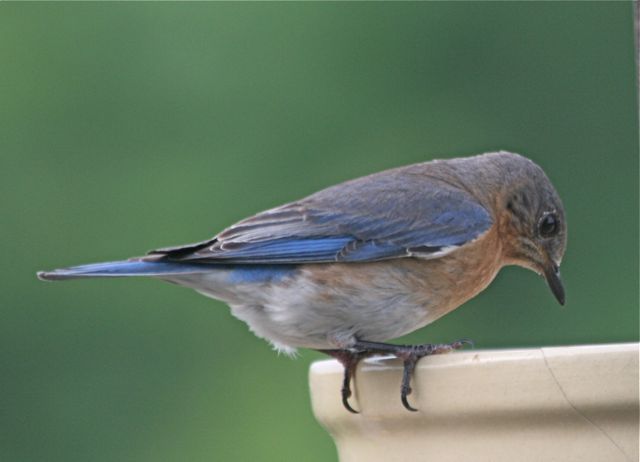
This photograph was taken June 12, 2008, of the same female bluebird who was suffering so in the photos taken May 28. Withholding the offending food has done wonders for her. See how the redness and swelling have subsided, and she's perching normally? Yaaaay!! She's having a little snack of mealworms here, in case you're wondering. And she'll have no subsidy for the rest of the month!
Happy birthday, DOD.
Labels: bluebird gout, gout in wild birds, lard, purines, why we feed birds

